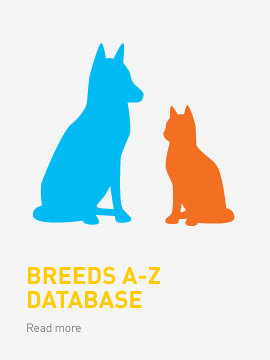Is pet insurance right for me?
Pet health insurance covers the cost of veterinary medical care and sometimes even theft. Depending on the type of policy that is purchased, a portion of or all medical costs may be covered. There are many companies and policy types to choose from, from “premier” to “accident-only” catastrophic coverage. Cost can vary widely depending on your geographic location and the type of pet you have. For example, “basic” coverage plans for dogs in the US cost around $10 per month and can be as low as £8 per month for “accident-only” cover in the UK. “Illness-only” policies which cover the most common illnesses (cancer, heart disease, arthritis, etc.) are a great option for pet owners on a budget.
Start researching online for the policy that is right for you. Your veterinarian may also be a great resource in your search. Also, talk to your employer about pet insurance benefits. Your employer may offer discount premiums or even subsidize your pet’s health care costs.
What will be covered?
Insurance policies typically cover hospitalization, medications, diagnostics, physiotherapy, dental and surgical procedures. The “fine print” of each policy should specify what is covered and what is not. Preventative care coverage for vaccinations and castration surgeries may also be available. If your dog is not sterilized, keep in mind that pregnancy is considered a “pre-existing condition” and will not be covered by most policies.
Do your homework before purchasing a policy and investigate how much each company will pay towards total costs per condition. Ask the company to provide testimonials for you from other clients. These are often available on the company’s website. Some companies have better reputations for paying on time, and your veterinarian may be able to advise you further.
Breed-Specific Diseases, Pre-Existing Conditions and General Information
If your pet is young, this is the best and most cost-effective time to purchase pet insurance. The majority of companies will not insure pets with pre-existing conditions or pets over a certain age. It is not unusual for policy costs to increase a little every year as your pet ages. Despite this increase, most pet owners find it affordable to insure their pet for life.
Purebred dogs and cats are more likely to have health problems than mixed breeds. This will be reflected in your premium cost. When you ask for a price quote, be sure to read the policy very carefully regarding breed-specific problems before purchase. For example, arthritis caused by hip dysplasia is often considered a “breed-specific illness” in German Shepherd Dogs and Labrador Retrievers. However, common dental problems like periodontal disease in Yorkshire Terriers may not be listed as a breed-specific problem, so dental coverage should be considered if you own breeds prone to dental disease.
A Few Advantages:
Value
Our pets are living longer than ever. Over time, chronic conditions may arise and pet insurance can help off-set out-of-pocket costs.
Peace of Mind
If your pet becomes ill, you will worry less about ‘how am I going to pay for this?’ and focus more on helping your pet get well. Sadly, sometimes people must decide to euthanize their pet because they cannot afford treatment. Pet insurance can provide the funding to back your pet’s healing process.
That ‘Rainy Day’
Many people don’t have an “emergency fund” of cash set aside for emergency or long-term pet care. It is easier to pay the monthly premium instead of remembering to set aside cash every month.
Use Your Own Vet
Most companies will pay you directly after you make a claim, so you do not have to find a veterinarian who accepts your insurance.
A Few Disadvantages:
Will that rainy day ever come?
Insurance can be much like gambling. If your pet is healthy his or her whole life, you may never have to use it.
Internet bargains
If a policy seems too good to be true – it probably is! Be educated before you purchase and seek out a reputable insurance company.
Time Limits
If your pet suffers from a chronic condition, your insurance may limit the amount that it pays per medical problem during the course of a year. Again, it is best to read the fine print of each policy before purchase.
Insuring your “four-legged children” has more benefits than disadvantages. Take a little time and investigate what may be best for your family. Having insurance can reduce your stress level and give you peace of mind. It only takes a few minutes to look at pet insurance policies- you might just find the perfect fit.






